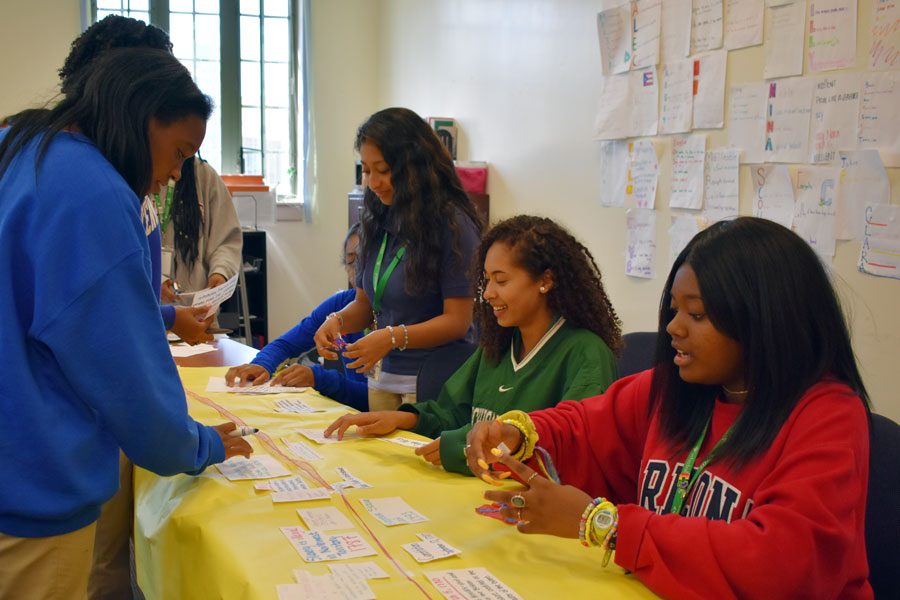New English course provides world perspective
One-semester class reads variety of ethnic literature
Students in Mrs. Kimberly Carver’s C period Voices of the World class complete a project, using cards to create a timeline of African-American history.
Learning about events such as the Transatlantic slave trade or the conquest of South America is easy. To many people, the number of deaths, intensity of labor and cruelty of treatment are just statistics to be regurgitated on a test.
However, this changes in a new class, Voices of the World: Ethnic Studies in Literature and Culture taught by Mrs. Kimberly Carver, an English teacher who also serves as the English language learner and AP director. Open to sophomores, juniors and seniors, this class dives into the psyche and culture of many ethnic communities.
According to Carver, Ethnic Studies is as much of a history class as it is about literature. Carver said, “We’re trying to look at (African American and Latino American cultures) from a historical perspective so we’re starting off in slave literature.”
Carver said the first quarter of this one-semester class deals with poetry and slave narratives, what she called “the only truly American form of literature.” From there, the class jumps ahead to works from the late 20th century from authors like Toni Morrison.
Carver said, “The second nine weeks is Latino American literature, a genre called ‘Magical Realism.’ Harry Potter might be considered magical realism.” Carver continued, “Latino magical realism has a lot to do with magical and mystical properties of early Aztec and Incan beliefs mixed with Catholicism, it’s kind of a little crazy like spirits and ghosts.”
Then, in the second half of the final quarter, Carver said the literature deals mainly with what she called “assimilation into American society and the problems involved in that. It’s not really problems, but people who were already here trying to figure out how to be Latino but still be American.” This can still be an issue in modern day life and helps students understand more about cultures foreign to them, she said.
The course operates with “a lot of choice,” according to Carver. There are many different texts by many different authors that might appeal to a wide range of readers. Carver said, “There are so many books and not enough time.” Carver continued, “It’s not one of those classes where we read a book and I tell you what that book means. We read a book and then talk about what it means to you.”
This is done through reflections and written and video journaling, but mostly discussions. Carver said, “A lot of the class focuses on talking about it because some of the content can be very painful and difficult to hear. It does take a lot of talking through it to find a place of understanding.”
Carver said she first thought of this course while she student taught at Arlington High School, but this is the first chance she has had to actually put that thought into practice. She said, “My class was nearly all African Americans who had never read any books from African American authors. I think it’s really important for kids to read from authors who look like them because they have similar experiences. You have a shared history and culture.”
Carver said teaching the class is depressing sometimes because of all that people had to endure. Carver said, “It’s been exciting for me when I get to explain to the students something that they didn’t know about history before. Knowledge is power.”
Carver said, “It’s really interesting to consider what your life is like and how much of that is shaped around how you look. It’s sad but true that we have a bad history in America of being scared of the other.” This class may help remedy that.
Carver concluded, “You can’t have an inclusive society unless you understand the society.”

Gracie Carr is a senior and a photographer for newspaper and yearbook. She is a member of Student Council, Riley Dance Marathon, National Honor Society...







